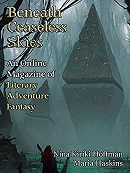 Beneath Ceaseless Skies #260, September 13, 2018
Beneath Ceaseless Skies #260, September 13, 2018
“Ancestor Night” by Nina Kiriki Hoffman
Reviewed by Gyanavani
The two beautiful stories in this issue deal with the complex nature of love between family members. The general assumption is that, connected as they are by a common biological heritage, love between members of the same family is pleasantly transparent. The writers’ conclusion, even familial love is not straightforward.
Master storyteller Nina Kiriki Hoffman’s “Ancestor Night” presents a blood-chilling family drama of impulsive decisions leading to irreversible grave consequences. A young girl wants to be with her lover, someone we have to assume, is frowned on by her parents. To divert their watchful attention and to gain time, she poisons their food. Unfortunately, instead of just falling sick as she had hoped, they succumbed to it.
The story is told from the point of view of the eldest son, Paolo. Through that first summer and fall when he, as the unwilling head, guides his family’s winding course around unfamiliar economic decisions and uncharted emotional terrain, he comes to two conclusions: 1) his parents had been foully murdered and 2) the murderer was most probably his favorite sister, Jasna. Paolo’s rage fuels his determination to get himself and all his siblings to the lake of ancestors to receive answers that would allow him to pass judgment and punish the offending member of the family.
There is a quiet vein of forgiveness that runs through the story. The parents rise from their icy grave not to demand vengeance but to talk to their guilt-wracked daughter and hand over the care and responsibility of their large family to Jasna.
In Maria Haskins’ “It’s Easy To Shoot A Dog” seven year-old Susanna leaves home one early fall morning to search for a pup with her four year-old brother in tow. On the fourth day she comes back home to her rough-tongued, poverty stricken parents with a pup in tow but no brother. And now ten years later she sets out with a rifle and a specially designed bullet to kill the witch with whom she had made the deal that gave her her faithful dog.
This is a heart-wrenching and thought-provoking story. Susanna’s hard and bitter parents assume she will become like them: small, mean, untouched by love. The witch in the forest also wants Susanna to deny love since it is a weakness that will hold her back. It is not these authority figures but the mute, unquestioning love of Brother, her dog, that shows Susanna a third path where love and knowledge exist side by side.